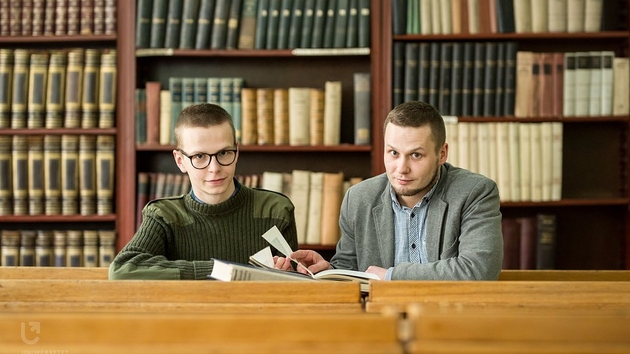You participated in the Zdolny uczeń – świetny student [Talented Secondary School Student – Brilliant University Student] programme twice. During both editions, you cooperated with dr Kamil Piskała (Faculty of Philosophy and History, University of Lodz). What was the subject of your projects?
In both projects, I examined the Polish labour movement in the 20th century. In the first edition, to be precise, the problems of the Polish communist movement. I was particularly interested in the origins of its members and the motivation behind their decisions to become communists. During the second edition, we were finishing the first project with a particular focus on the socialist movement and its radicalisation in Poland in the 1930s.
Why are you interested in such topics? Do you think they are relevant in the context of contemporary historical research?
I think they are very relevant. Especially when it comes to history lessons in primary and secondary schools. We did not focus enough on the lives of ordinary people, for example, workers. In my opinion, too much emphasis is placed on the role of diplomacy, the lives of individual dynasties or what can collectively be called the grand historical narrative. The truth is yet that all of world politics in the 20th century revolved around the working class. I think that a close look at this milieu adds a great deal to historical research. After all, one must remember that the proletariat had very clear political views and expectations.
After completing both projects and passing your A-level exams, you applied to a number of universities abroad, but ultimately decided on Goldsmiths, University of London. Why?
For me, the greatest advantage of Goldsmiths is that it places a very strong emphasis on independent research and the projects carried out there at this moment are of great interest to me. Since I would like to focus on history research in the future, it is not only the quality of teaching itself that is important to me, but also the level of research. For example, there is now an interesting project on the presidential election in the Weimar Republic in 1932.
With this in mind, would you say that participating in the Talented Secondary School Student programme inspired you to pursue independent research projects?
Definitely so. First of all, the programme helped me decide what I wanted to do after my studies. I realized that I would like to do research work. I also started to look at potential universities from this perspective. I was less concerned about their prestige and position in the rankings, and more in the quality of research and whether its field at a particular university interested me. Moreover, participation in Talented Secondary School Student will definitely help me in my studies, considering that – especially in England – the learning system is more independent. The internships I completed over these two years at the University of Lodz will definitely help me.
So will you want to continue your research at the University of Lodz during your studies?
I think that the subject matter of my future research will be quite similar. I do not rule out the possibility of developing interest in something new during my studies. I will learn new things and read a lot of books. At the moment, I am determined to continue researching the labour movement in Poland and Germany. I think that I will stay with the interwar period.
Finally, what are your plans for the future?
I will definitely spend the next few years at Goldsmiths. It is possible that I will move to another country to complete my master's studies. I hope to go on an exchange programme next year to learn about research methodologies in other countries in Europe and the world. But whichever university I graduate from, earning a PhD degree in history is my goal number one, but I don’t go that far ahead yet.
The Talented Secondary School Student programme promotes the idea of early development of academic aspirations among high school students, teachers and parents. The University of Lodz, as the largest research university in central Poland, accepts the best secondary school graduates from all over the country. Its priority is to create space for the development of future professional staff for the purposes of the private and public sectors and, above all, the Polish and international scientific community.
University of Lodz is one of the biggest universities in Poland. Its mission is to educate top-class scientists and specialists in numerous fields of humanities, social sciences, natural and exact sciences as well as health sciences. UniLodz cooperates with business, both at the staff level by providing qualified employees as well as at the scientific level, by offering its know-how to enterprises from various areas of economy. University of Lodz is an academic institution open to the world – the number of its international students is constantly growing, while its Polish students, thanks to Exchange programmes, get to know Europe, Asia and travel overseas. The University is a part of Lodz, it operates for and with the community of Lodz by getting involved in many socio-cultural projects.
Edit: Promotion Centre, UL

